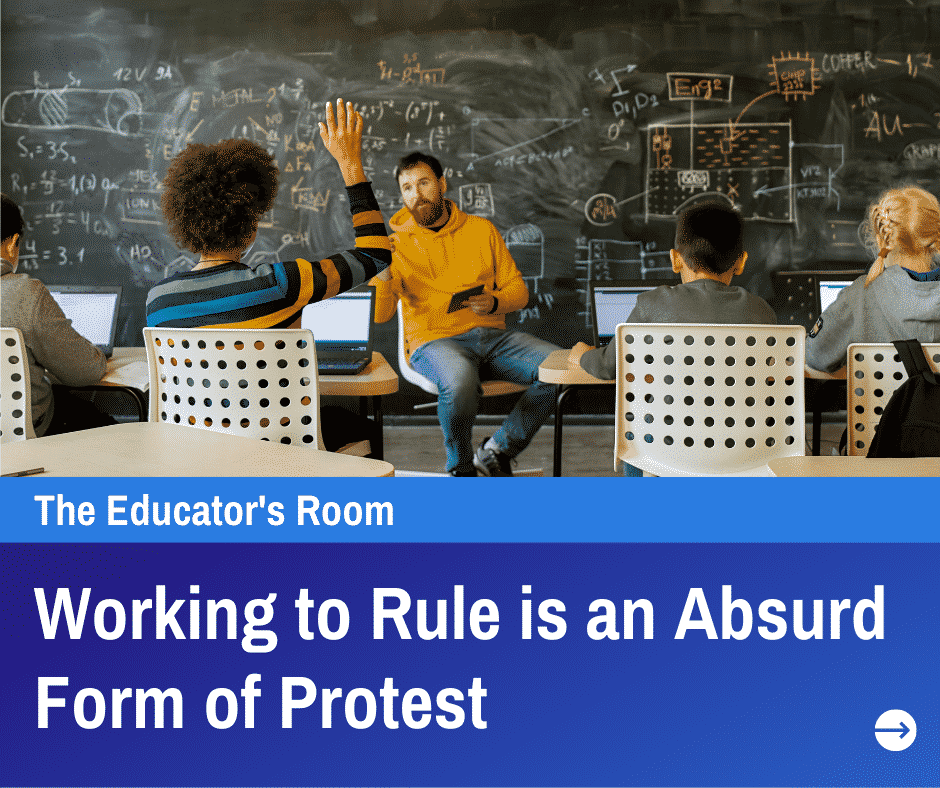Working to rule is a form of protest being considered by teachers across the country. The basic tenet is that teachers will not engage in work-related activities outside of their contracted workday.
Once they leave for the day, they won’t grade papers.
They won’t check or respond to emails.
They won’t plan lessons.
It’s an incredibly divisive issue. Many teachers are afraid of upsetting the public or dividing and weakening the union.
This is lunacy! How is work to rule even considered a form of protest? Teachers working to rule aren’t refusing to work. They are simply refusing to work outside of work. Essentially, people are upset at teachers for saying they will work when they are paid and contracted to work!
What is Work to Rule an Admission of?
Being angry at teachers for working to rule is an admission of three things. First, it’s an admission that teachers cannot possibly accomplish all of their assigned tasks during their workday. People are angry because they know that if teachers don’t answer emails, plan, or grade outside the workday, their kids will suffer. If teachers were able to fulfill all of these duties during the day, work to rule would just be…normal.
Second, schools are exploiting the goodwill and grace of teachers. Teachers are saddled with too many tasks, yet the instinct is not to adjust the duties or expectations but rather insist that teachers complete their work as a charitable act to the community. This is America! Our capitalist foundation should be enraged that anyone would entertain the idea of working as a form of charity.
Third, it shows the obsession and addiction Americans have with work. Our identity is consumed by our work. It is second nature for us to assume that work should interfere and interrupt our personal lives.
What does working to rule expose?
Work to rule exposes these glaringly abusive and exploitative practices that teachers labor under. But, for those who remain unconvinced, let’s transpose the expectations of teachers onto plumbers. Would we get mad at plumbers who buck under similar demands?
Suppose you hire a plumber to replace your toilet. When he finishes the toilet installation, you demand he folds your laundry. After all, he’s at your house, you have negotiated a labor contract, and he can fold laundry. You’re laughing. Why would anyone expect a plumber to fold laundry? He has no specific skills that would warrant him folding your laundry.
However, every day we ask teachers to do numerous tasks which are poor uses of their skills: bus duty, hall duty, cafeteria duty, coverage, etc. Just like folding laundry, these are essential tasks. They are beneath no one’s dignity. The problem is that in schools across the country we waste the skills of teachers and complain that schools and students are not performing to expectations.
Still not buying it? Let’s change the analogy.
Instead of demanding your plumber fold laundry, you demand he install a ceiling fan or replaces your roof. The plumber isn’t a skilled electrician or roofer. Such a demand on him is laughable, if not dangerous. Nonetheless, teachers are asked to serve as counselors, social workers, behavioral interventionists, security guards, record keepers, and beyond. All jobs for which they are not trained.
We wouldn’t imagine our plumber agreeing to any of these demands. We don’t even entertain the idea of making the request. When the plumber refuses these requests, he is working to rule. No one finds any fault in his decision. Yet, every day we make similarly outlandish requests of our teachers. When they refuse, they are labeled as whiners, unwilling to go the extra mile.
What do teachers struggle with?
And many teachers wrestle with the idea of working to rule. Teachers get into the profession because they like kids. They like helping others. They are inspired by a teacher who inspired them. The dream is to make a difference. So doing less than trying to change the world seems like a pretty draconian step backward.
Working to rule does mean less robust lessons, less prompt grading, less feedback to students, and reduced communication between home and colleagues. But, if we do not tackle the abusive and exploitative practices dominating the landscape of schoolhouses across the country, the costs to students are far greater. It’s already hard to recruit and retain teachers. Exploitation and abuse don’t make it easier.
For teachers to do their best work, they must be healthy. So long as teachers’ work and grace are exploited, teachers and, as a consequence, students will suffer. For those critical of teachers working to rule, insisting on the status quo is what’s hurting students.







Finally, someone is telling the truth! So many good teachers have been ground down and out of the profession. Is it any wonder we have record levels of teacher burn-out and teacher shortages? Sadly the burden extends beyond teaches. We see custodians, yard duty staff, and yes even school administrators tasked with many extra curricular duties. The real question is how do we fix it?
See Teachers as human beings and not robots. We expect way too much from them. Too much work and too many deadlines. Teachers have loved ves and families also. We expect them to work unpaid overtime, take no sick days, or vacations. Then in order to make more money my they spend what little time they may have taking classes. There is no other job that has union backing that gets away with this.
This misses the point.
Working to rule as a form of protest is outlining the absurdity of a given contract and the further absurdity of the uncompensated demand you are, out of the goodness of your heart or dedication to your profession, already doing outside the scope of your compensated expectation.
It is useful specifically when:
– You have an entitled management, unresponsive management/bureaucracy
– You have a set of demands that must be met
It’s inevitably a form of coercion to force the person in power over you to view things from your perspective. Absent that, they will continue not engaging in interpretive labor. You will also continue to be abused and mistreated.
To your detriment, you live in a capitalism. That comes with certain expectation that you, the worker, will always have to fight for reasonable treatment and compensation on a continuous basis. That is implicit load that will always be yours as it is not a feature of the system; you must compete for your place. Unions are one mediocre way of doing that in a world where power is being continuously consolidated.
If you don’t like that (and really, what reasonable person would), I recommend seeking alternatives systems, better voting methods and new representation that can be obtained via those means.
I absolutely hate everyone who frames working to rule as “coercion” or “bad”. It’s literally called doing the job you’re paid for. Is our society so out of whack that doing what you’re paid to do is considered not enough? Pay me more, or put it in my contract if you want me to do more, period.